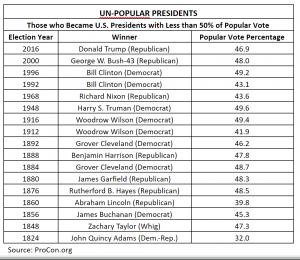Do you know how many U.S. presidents won election with less than 50 percent of the popular vote? Many are in a dither about Donald Trump having received less than a majority of the popular vote, when in fact almost one-third of all the U.S. presidents (14, to be precise) did not receive 50 percent of the popular vote (because of third-party candidates) in one or more of their wins. There were three two-term presidents, Bill Clinton, Woodrow Wilson and Grover Cleveland, who failed to obtain 50 percent of the popular vote for either term.
 Eight presidents, including Bill Clinton in 1992, had a smaller percentage of the popular vote than Mr. Trump. Many of those who complain about this being unfair apparently fail to understand that the United States is a constitutional federal republic and not a direct democracy — by the deliberate design of the American Founders for many good reasons.
Eight presidents, including Bill Clinton in 1992, had a smaller percentage of the popular vote than Mr. Trump. Many of those who complain about this being unfair apparently fail to understand that the United States is a constitutional federal republic and not a direct democracy — by the deliberate design of the American Founders for many good reasons.
In the modern era, Ronald Reagan (1984) and Franklin Roosevelt (1936) had both the biggest popular and electoral vote margins. Reagan won by 525 to 13, and Roosevelt won by 523 to eight electoral votes. The all-time record belongs to James Monroe who won by 231 to 1 in 1820.
There are always claims of some voter fraud and electoral incompetence, and it is always true. Most often, the amount of alleged fraud is too small to make a difference, but not always. In 1960, Richard Nixon lost to John F. Kennedy by a mere 118,000 votes, and the alleged fraud in Chicago was sufficiently large, which could have given Nixon Illinois and the election. Nixon decided not to contest the results.
There appears to have been substantial fraud in Detroit this year, where there were significantly more votes cast than registered voters, almost all going to Hillary. If Michigan had not gone for Mr. Trump, and instead he was down only a few thousand votes and the state was the key for the election, one can only imagine the national drama that would now be playing out.
The establishment media has been telling everyone that Russian President Vladimir Putin wanted Mr. Trump to win, and that is why the Russians were allegedly behind the revelations of the Democratic National Committee’s and Clinton campaign chairman John Podesta’s emails. But if you were the leader of a country that relied primarily on oil and gas sales to cover your budget and provide foreign exchange, why would you want the candidate of your biggest competitor, who said he was going to greatly expand U.S. oil and gas production, to win?
Russia, for a number of years, indirectly funded, with tens of millions of dollars, U.S. environmental organizations that actively oppose U.S. oil and gas development. This was rational for Russia to do because it reduced the potential for the U.S. oil and gas industry to compete with them. Hillary Clinton had made it very clear that she would side with the environmental organizations against those who wished to expand U.S. gas and oil production. By contrast, Mr. Trump said he would do everything possible to encourage U.S. domestic production — and his new Cabinet appointees show that he was very serious.
Russia is a very high-cost producer of oil and gas because of the remoteness of many of its fields and harsh climate, as well as the fact that its industry is largely under state control, with all of the attendant inefficiencies. Many of the U.S. fields are relatively low-cost, particularly as a result of all the new technologies. U.S. market share of global oil and gas production will continue to increase while Russia’s will almost certainly decrease. Certainly, Mr. Putin understands this.
In addition, the Clinton Foundation and John Podesta and his brother have all been recipients of substantial Russian-sourced money. In sum, Mr. Putin has made a very considerable investment in the Clintons and their allies — why throw all that away? There are foreign leaders like Israel’s Benjamin Netanyahu, who may have wanted Hillary to lose as payback due to the Obama administration’s overt attempt to help his opponents in his re-election campaign. And it has been alleged that there are people in the U.S. intelligence community who wanted to see Hillary lose, and would know how to make it look like a Russian hack.
Those who argue that Mr. Putin wanted Mr. Trump to win are implicitly arguing that the Russian president is irrational, and thus not interested in preserving Russia’s long-term economic interests.
I do not pretend to know who Mr. Putin wanted to win the U.S. election, but he had already shown that he knew how to deal with Hillary, and he should have understood that Mr. Trump’s economic actions are unlikely to benefit Russia.